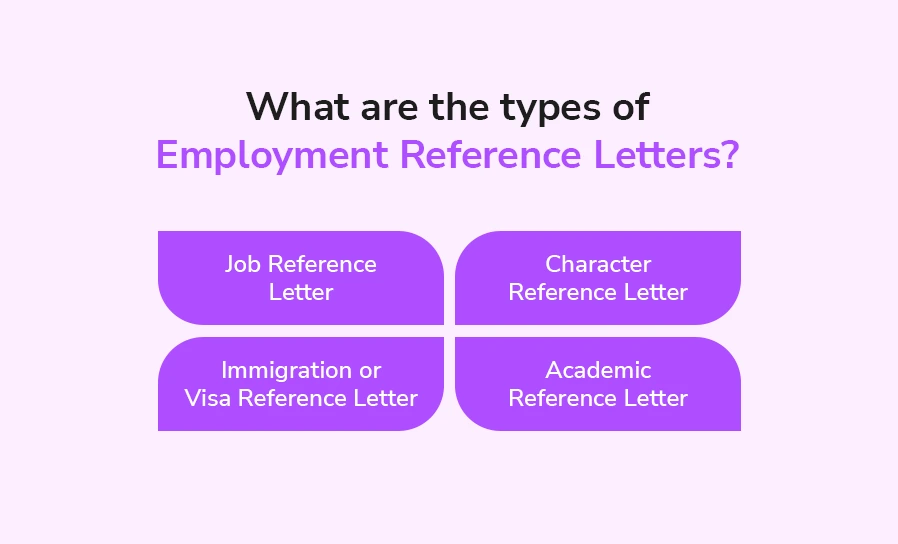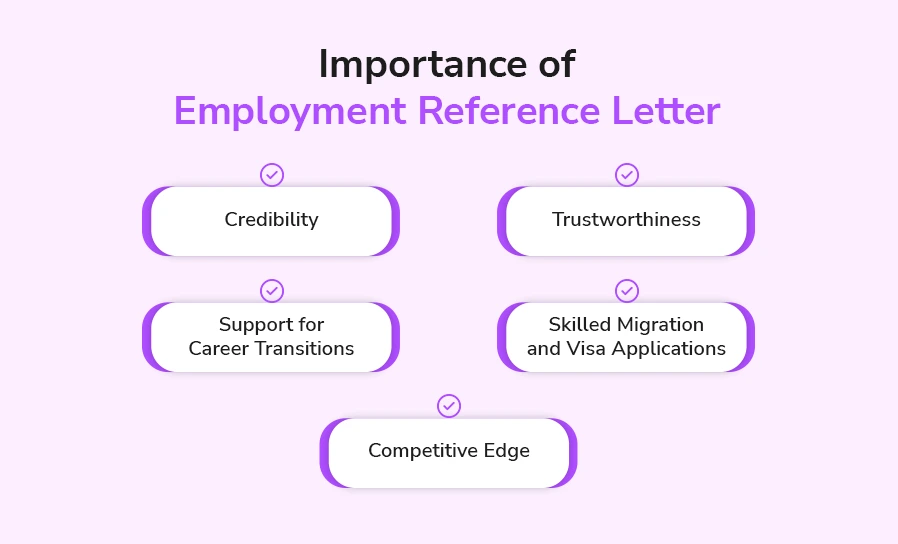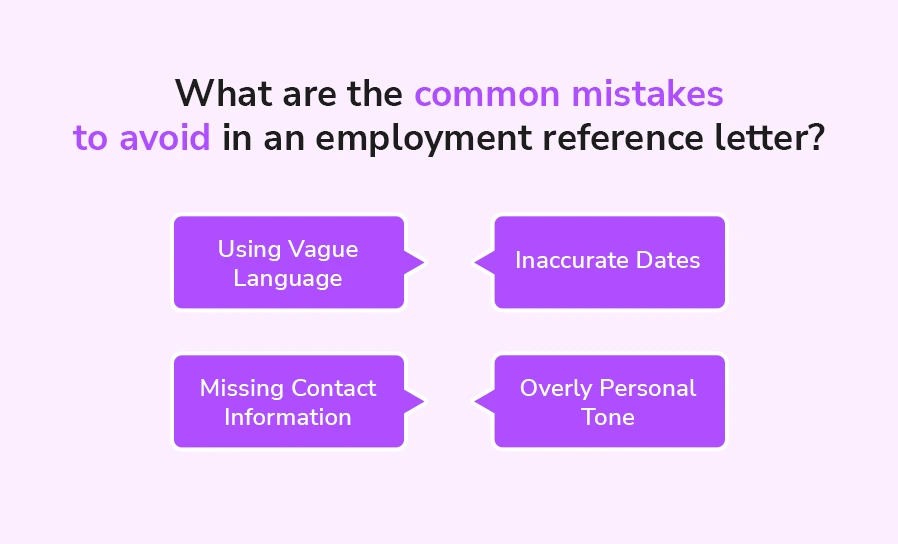A professional reference letter stands as a key document that strengthens job applicants as they pursue career advancement through job applications and career promotion or when they seek immigration benefits. This letter serves as a powerful validation tool for your professional review, which strengthens your professional reputation while helping you access new professional doors.
This detailed article explains employment reference letters, starting from their definition through their significant components, before discussing their essential role in professional career growth and transitions. This article provides complete information about employment reference letters by explaining their purpose and proper request procedures.
🔑 Key Highlights
- An Employment Reference Letter confirms your job title, duties, and work period, boosting career and immigration prospects.
- The employment reference letter produces significant improvements to Australian immigration visa applications and career progression.
- Your Employment Reference Letter must contain complete and accurate information without any unclear statements, and it needs to have both dates and contact details and avoid using an informal writing style.
What Is an Employment Reference Letter?
Employers and supervisors create formal employment reference letters to verify previous employees’ work duties while describing their skills and accomplishments at the job. The reference emerges as an official document that businesses provide during workforce departures or hiring applications and professional background verification requirements for legal or immigration reasons.
Recommendation letters carry subjective and personal content, but employment reference letters provide factual details about job-related qualifications.
What are the types of Employment Reference Letters?

The types of employment reference letters are as follows:
1. Job Reference Letter
Job reference letters form an essential requirement for employment candidates during their new job applications. The previous employer provides this document, which details your job responsibilities and performance outcomes, together with information about your work conduct throughout your employment period.
References of this kind enable businesses to verify your professional experience and assess your potential fit for the role you have applied for. Your application becomes stronger when you include a job reference letter that provides credibility to everything in your resume.
2. Character Reference Letter
Escape the regulation of job reference letters because character reference letters analyse your attributes without evaluating your occupational abilities. Writing this letter requires a person who recognises you from personal interactions rather than professional settings, such as your mentor, but also includes neighbours and family friends.
The reference letter shows how you are trustworthy with excellent work habits as well as strong relationship-building abilities. You need character references mainly in community service, volunteer work and legal settings when trustworthiness and personality qualities matter.
3. Immigration or Visa Reference Letter
People executing visa or migration processes must obtain immigration or visa reference letters as a basic requirement. These letters support skilled immigration applications aimed at residents of Australia, Canada, and New Zealand.
The document comprehensively details your employment background as well as your job responsibilities and their relation to occupational standards. Ambassadorship review letters allow immigration officials to identify which visa category suits your professional qualifications, including skilled or employer-sponsored work visas.
4. Academic Reference Letter
Referees must provide academic reference letters to candidates who seek admission to colleges or universities or want to secure scholarships or internships. References for migration purposes can be prepared by a professor, lecturer or employer when the letter demonstrates support for academic objectives.
This document showcases your academic capability alongside your scholastic drive and ability to thrive as a student in a different college setting. The document helps institutions assess your preparedness for programme acceptance.
Importance of Employment Reference Letter

The reference letter for employment serves as an important verification tool to establish a record of your previous work experience, thus improving the credibility of your job application. A skilled migration document, together with international job applications, requires employment reference letters to be submitted.
Some of the importance of the employment reference letter are as follows:
1. Credibility
The employment reference letter functions as a potent instrument that proves your work-related qualifications. An employment reference letter provides more credibility than resumes and job applications through its ability to verify your skills and accomplishments based on information from a previous employer.
Your potential employers depend on this external confirmation to believe your qualifications, thus creating a more trustworthy professional profile.
2. Trustworthiness
Organisations tend to put greater faith in real-life experience records from employees rather than what job seekers include on their résumés. A reference letter creates an authentic record that displays your work credentials, together with your accomplished results and job performance assessment.
Your documented achievements bring managerial trust in your abilities since they can lean on a reference person who observed your performance firsthand. The employment reference letter functions as an indispensable tool for validating your trustworthiness to become an employee in the desired role.
3. Support for Career Transitions
Career transitions and industry changes, alongside moving between nations, prove difficult when you want to show your suitability to potential employers. The employment reference letter serves as beneficial documentation in these situations.
Such documents present an opportunity to reveal your transferrable abilities regardless of unaligned industry experience or former positions. A properly written reference letter facilitates an employer’s understanding of how relevant your past skills are to your new professional responsibilities, thus becoming crucial during career transitions.
4. Skilled Migration and Visa Applications
A skilled migration reference letter stands among the essential documentation needed by people who wish to pursue different employment and immigration prospects outside their homeland. Engineers Australia, together with the Australian Computer Society (ACS) and government institutions, including the Department of Home Affairs, needs these reference letters during skills assessments and visa applications.
These letters function to confirm your professional qualifications so you can meet the employment requirements needed to live and work in the target country. The reference letter stands as an essential requirement that plays a crucial role throughout the immigration evaluation.
5. Competitive Edge
A solid professional recommendation helps candidates to stand out against their competition in today’s employment field. Professional credentials among applicants tend to match each other, but your application stands out when it contains an endorsement from a respected previous employer.
The reference letter authorises the recognition of your attributes, together with workplace dedication and work accomplishments, which makes your application stand out. A trustworthy reference establishes both your technical competencies and positive work achievements from previous positions, which makes you more attractive to potential employers.
What are the common mistakes to avoid in an employment reference letter?

An excessive number of individuals fail to avoid mistakes when producing or delivering employment reference letters. People commonly make mistakes by using imprecise language, in addition to supplying incorrect employment date information or by missing contact information and by not using professional letterhead in their references.
1. Using Vague Language
An employment reference letter contains a major error when it demonstrates vague statements instead of detailed information. Immigration officers and potential employers fail to understand your job responsibilities because the expression of tasks as “various” and projects as “different” remains too generalised.
Job references should contain detailed information about actual responsibilities and the technologies operated, and substantial accomplishments. Your professional experience becomes more valid when you describe your role in detail, as this matches occupational criteria, most notably for immigration assessments.
2. Inaccurate Dates
The process of visa approval or job applications becomes problematic when the dates indicating your work history do not match between records. Any discrepancy between the dates mentioned in your reference letter and other supporting documentation about your work history will create uncertainty about your employment record.
The incorrect documentation regarding skilled migration work history may cause delays or result in visa application denial. You should verify that all employment durations are precise and visible in the document.
3. Missing Contact Information
Reference letters appear untrustworthy when they lack essential contact information, including company address and phone number, email, and supervisor identification. Immigration authorities and recruitment evaluators have difficulty verifying the authenticity of your letter because they need proper contact details.
Every reference letter needs to have the complete and newest contact information belonging to the author.
4. Overly Personal Tone
Employment reference letters need to stay formal and professional in tone when describing good character traits of employees. Keep personal statements related to performance out of the reference because they lack professional relevance.
The document should centre on your work duties, together with your abilities and achievements. Credibility increases as well as professionalism because the letter maintains factual and objective content that matches official assessment and formal application protocols.
Conclusion
Professional and global societies operate with rapid speed today, so an employment reference letter functions as a forceful document that affects significant life choices. This document verifies your work record while it demonstrates your abilities and establishes trust in your competence. Your employment reference letter serves as an essential connection that enables you to pass from your notable past success to promising upcoming chances, whether you plan career changes or visa applications or educational advances.
The ability to request, compose, and deliver employment reference letters with perfection marks you as superior to other job candidates. The reference letter should be written professionally and accurately, and be available as needed. Life today rewards credibility above all else, which makes this short reference letter potentially your most important possession.
FAQs
1. What is an employment reference letter?
An employment reference letter is a formal document that confirms your job title, duties, and employment period.
2. Why are references important for employees?
References validate an employee’s work record, skills, and performance, helping to build trust with potential employers or institutions during job applications, promotions, or visa processes.
3. What is the purpose of a reference document?
The purpose of a reference document is to officially verify an individual’s employment details, such as job role, duration, and responsibilities, for use in job applications, immigration, or further studies.
4. What happens if you have no references for a job?
If you have no references, employers may question the credibility of your experience, which can reduce your chances of getting the job. However, you can explain your situation and offer alternative proof, like work samples or performance reviews.

